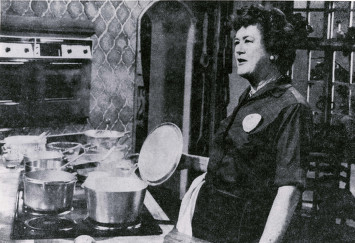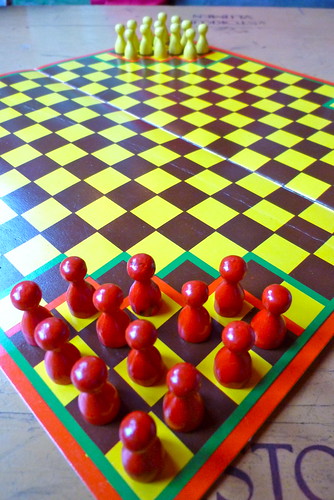The season finale of the television show True Blood is right around the corner – are you all caught up on the vampire drama? If not (and even if you are), take a bite out of our favorite words from the little town of Bon Temps, Louisiana, where “everyone wants a taste.”
Contains possible spoilers and definite expletives.
abjure
Alcide: “I lost packmaster. I’ve been abjured.”
Jackson: “Well, you’re a lone wolf now, just like your old man.”
“Everybody Wants to Rule the World,” August 5, 2012
To be abjured means to be banished from a wolf pack. The packmaster is the leader of the wolf pack while a lone wolf refers to both “a wolf that is not part of a pack” and “a person who avoids the company of others; a loner.”
baby vamp
Pam [to Jessica]: “Since when did I become a halfway house for wayward baby vamps?”
“Sunset,” August 19, 2012
A baby vamp is a newly-turned vampire, perhaps in the last three years or so (some vampires are hundreds and even thousands of years old). Baby vamp is also 1920s slang for “a popular girl,” where vamp means “a woman who uses her sex appeal to entrap and exploit men.”
daywalk
Russell: “The legends are true. The blood of the Fae allows us to daywalk.”
“Gone, Gone, Gone,” August 12, 2012
To daywalk means to walk during the day. When True Blood’s vampires drink fairy blood, they are protected from the sun and may walk during daylight hours.
dead check
Terry: “She’s alive, sergeant!”
Patrick: “Dead check her.”
“Let’s Boot and Rally,” July 8, 2012
Dead checking is “U.S. military jargon for the practice of verifying the death of Iraqi insurgents and the subsequent killing of those who remain alive.”
drainer
Alcide: “I didn’t do anything to Debbie. She’s probably holed up with some drainer getting loaded.”
“Whatever I Am, You Made Me,” June 24, 2012
A drainer is one who attacks vampires and drains their blood supply for the purpose of selling the vampires’ blood as V, a highly addictive drug that “may cause psychotic or murderous rampages by human users upon the first use.”
fangbanger
Tara: “I never took you for no fangbanger.”
Hoyt: “I never took you for no vamper.”
“Let’s Boot and Rally,” July 8, 2012
Fangbangers are “vampire groupies—those who enjoy having sex with vampires and being bitten.” More kinds of groupies.
fang boner
Jessica [to Steve Newlin]: “Look at you, fang boner, and real boner.”
“Authority Always Wins,” June 17, 2012
A fang boner is the way a vampire shows he or she is sexually aroused – with “erect” fangs.” Boner meaning “a blunder or an error” originated around 1912, says the Online Etymology Dictionary, as baseball slang, perhaps as a shortening of bonehead. Boner meaning “erect penis” is from the 1950s.
glamour
Commander: “They know too much.”
Bill: “Nothing that a little glamouring won’t take care of.”
“Hopeless,” July 15, 2012
Glamouring is a type of hypnosis that vampires can perform on non-vampires. An archaic definition of the word glamour is “enchantment; a supposed influence of a charm on the eye, causing it to see objects under an unreal semblance; hence, anything that obscures or deceives vision, physical or mental; fascination; charm; witchery.” The word is Scottish in origin and an alteration of the English grammar, which had the “medieval sense of ‘any sort of scholarship, especially occult learning.’”
A grimoire, which comes from an altered form of the French grammaire, “grammar,” is “a book of instructions in the use of magic or alchemy, especially summoning demons.”
ground
Molly [regarding iStakes]: “These things are totally indestructible, waterproof, fireproof yada yada yada. Knows who you had for breakfast, and where you go to ground.”
“Whatever I Am, You Made Me,” June 24, 2012
To ground means, for vampires, to sleep somewhere away from the sun, which could mean literally in the ground or in a dark well-protected place such as a basement. On the television show Being Human, a grounding for a vampire has another meaning: the punishment of being buried alive, playing on the meaning of being grounded, “confined to one’s room, typically by a parent, as a punishment.”
ifrit
Brian: “It’s called ifrit. It means ‘the evil,’ an infernal being of smoke and fire, and it’s coming for us.”
“Let’s Boot and Rally,” July 8, 2012
An ifrit, also afrit and afreet, is (in Arabian mythology), “a powerful evil demon or monster,” and a type of jinn, “a class of spirits lower than the angels, made of fire, capable of appearing in both human and animal forms, and exercising supernatural influence over mankind, for both good and evil.” The word ifrit comes from either the Arabic afara, “to rub with dust,” or the Middle Persian afritan, which corresponds to the Modern Persian word for “to create.”
laid man
Jason: “Listen, I ain’t been to med school, or fairy school, or nothin’. So if you could put it in terms a laid man can understand, I’d appreciate it.”
“In the Beginning,” July 22, 2012
Laid man here is an eggcorn, a lexical misuse that makes sense to the speaker or listener. What Jason means is layman, “an unprofessional man; a man belonging to the laity or general mass of people,” but laid man makes sense to him because he is one who gets laid often, or has a lot of sex.
An eggcorn from Jason last season was parrot-phrase: “I might be parrot-phrasing a little.” He meant paraphrase, “to restate or translate with latitude.” To parrot means “to say or repeat by rote or not understandingly, like a parrot; repeat mechanically.”
mainstreaming
Roman: “Every vampire on this council has committed our careers, our lives, our destinies, to mainstreaming. Co-existence with humans is not an option. It is a necessity.”
“Authority Always Wins,” June 17, 2012
Mainstreaming refers to, according to the True Blood Wikia, “a social movement within the vampire race, in which vampires attempt to integrate themselves into everyday human society.” The term comes from mainstream, “to incorporate into a prevailing group.” The original sense of mainstream, says the Online Etymology Dictionary, was “principal current of a river,” which originated in the 1660s, and came to mean “prevailing direction in opinion, popular taste, etc.” around 1831.
True Blood’s mainstreaming may have the ironic echo of mainlining, “inject[ing] a drug intravenously,” with the idea of the vampires ingesting humans’ blood, or vice versa.
maker
Pam: “You’re my maker, Eric, and I would die for you gladly a thousand times before I would ever betray you. You know I would.”
Eric: “Then you’d be a fool.”
“We’ll Meet Again,” July 1, 2012
A maker is a vampire that has turned a human into a vampire, and plays on maker as a synonym for God. The new vampire is the maker’s progeny. Makers have full control over their progeny until the progeny are formally released.
necromancer
Bill: “You’re taking a huge risk. Why would you choose – ”
Nora: “Because I’d do anything for Eric. . .and because you did what you did protecting us from the necromancers.”
“Turn! Turn! Turn!” June 10, 2012
A necromancer practices necromancy, “divination by calling up the spirits of the dead and conversing with them; the pretended summoning of apparitions of the dead in order that they may answer questions.”
nest behavior
Jessica: “Bill, I’ve never seen him like that. He was cold. Cruel, even.”
Pam: “That’s nest behavior. When vampires live together for a long time and feed off of each other’s blood, they form a nest and become sadistic and crazy. From what you’re telling me, drinking that Lilith’s blood has made it a nest on steroids.”
“Sunset,” August 19, 2012
Nest in this context means “a place or environment that fosters rapid growth or development, especially of something undesirable; a hotbed,” and conveys a hornet’s nest, “a highly contentious or hazardous situation.” Nesting behavior is the behavior of humans or animals as they prepare to give birth to young.
peckerwood
Pam: “You exist only for Tara’s nourishment. You will consider it a privilege to let your racist, peckerwood blood shoot into her gorgeous cocoa mouth.”
“Somebody That I Used to Know,” July 29, 2012
A peckerwood is “a slur used through the mid 20th century by southern African Americans and upper class whites to describe poor rural whites.” The word originated around 1859 as a “U.S. Southern black dialectal inversion of woodpecker; in folklore, taken as the type of white folks (1929) and symbolically contrasted with blackbird.”
Sanguinista movement
Roman: “Have you heard of the Sanguinista movement?”
Steve: “They believe that humans should be farmed like cattle, owned like slaves.”
“Whatever I Am, You Made Me,” June 24, 2012
The Sanguinista movement is “a faction of rebellious vampires. . .opposed to mainstreaming,” who “believe that vampires should dominate humans instead of coexisting in peace.”
The word Sanguinista is a blend of sanguine, “bloodthirsty; bloody,” and Sandinista of the Sandinista National Liberation Front, “a social-democratic political party in Nicaragua which was communist in the 1980s” that “overthrew [the president] Anastasio Somoza Debayle in 1979, ending the Somoza dynasty, and established a revolutionary government in its place.”
Sandinista comes from “Augusto César Sandino (1895–1934), the charismatic leader of Nicaragua’s nationalist rebellion against the US occupation of the country during the early 20th century.”
silver
Eric: “Be careful. [Russell is] the strongest vampire I’ve ever met.”
Salome: “He’s been silvered, intravenously. He’s quite impaired.”
“Hopeless,” July 15, 2012
Silver “seems to be the only element on earth able to hold down and bind a vampire,” burning their skin upon contact. In some folklore, a silver bullet is deadly to werewolves, witches, and other supernatural creatures. A silver bullet also refers to “an infallible means of attack or defense,” or “a simple remedy for a difficult or intractable problem.”
skinwalk
Sam [to Luna]: “I’m taking you back to the hospital. My brother died from skinwalking.”
“Everybody Wants to Rule the World,” August 5, 2012
To skinwalk means to change into another human, which differs from shapeshifting, which means changing from human into animal form. Symptoms after an episode of skinwalking “include running a high fever and vomiting blood,” and possibly death.
supe
Jason: “Those guys, and all those strippers, they’re fairies, like Tinkerball [sic]! They’re supes, man.”
“Let’s Boot and Rally,” July 8, 2012
Supe is short for supernatural, “that which is above or beyond the established course or laws of nature; something transcending nature.”
true death
Salome: “Her betrayal was unforgivable. She met the true death.”
“Authority Always Wins,” June 17, 2012
The true death refers to “the ultimate destruction of an otherwise immortal being, such as a vampire.” Vampires may die by a wooden stake or bullet through the heart, prolonged exposure to sunlight, being drained of all blood and not replenished in time, and decapitation.
WT
Sookie [to Luna]: “I got junk magazines, junk food because I know how awful hospital food can be, and of course some flowers to class it up a bit so I don’t seem to so WT.”
“In the Beginning,” July 22, 2012
WT stands for white trash, “a disparaging term for a poor white person or poor white people.” The terms seems to have originated around 1831 originally as “Southern U.S. black slang.”





